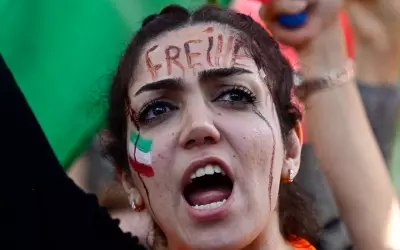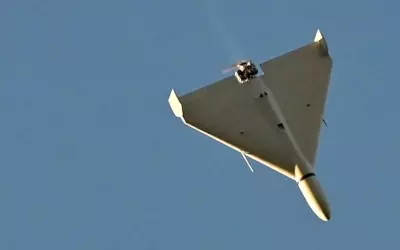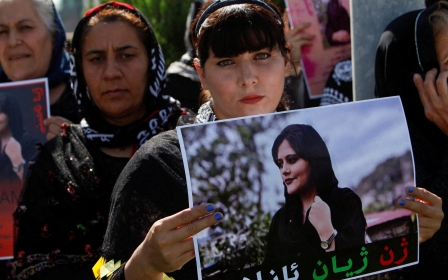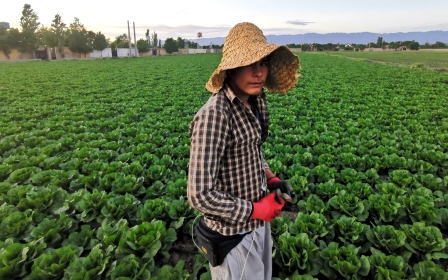Iranian press review: Russia's ‘joy’ over sanctions on Iran sparks anger
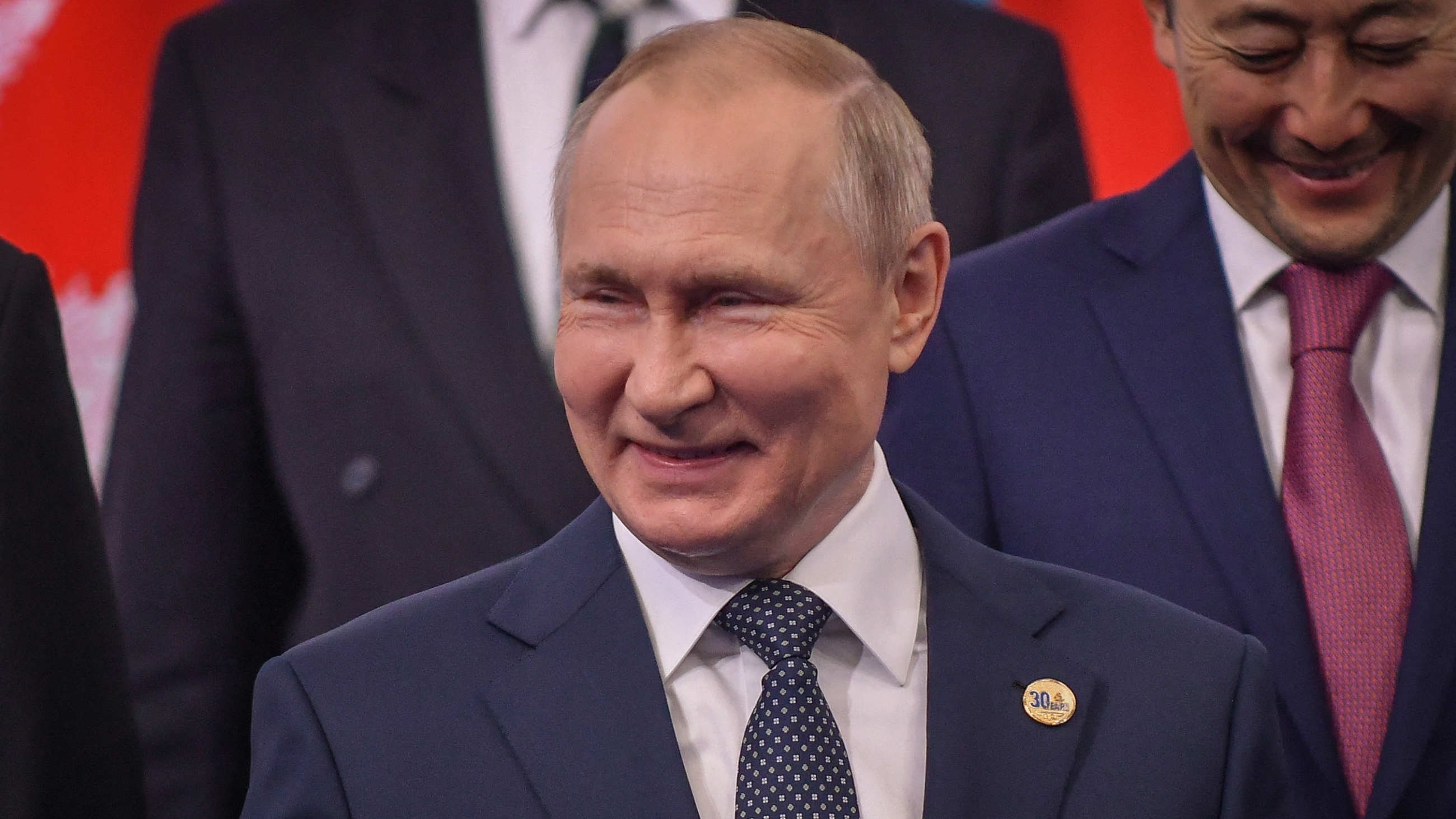
Moscow looks forward to more sanctions on Iran
Comments by a Russian official welcoming new international sanctions on Iran as a profitable situation for Russia have sparked anger among experts and Iranians, who have been under tremendous pressure due to a severe economic crisis.
Last week, BBC Persian reported that Konstantin Simonov, the head of Russia's National Energy Security Funds, relayed Moscow's delight at additional sanctions on Iran's oil, gas, and petrochemical industries.
According to the report, Simonov told a Russian state TV channel: "Iran will remain under sanctions, and they will worsen, which honestly speaking, is good news for us."
"For the future, we will have to enter into joint economic relations. We have quite ambitious investment plans, which include the Iranian oil and gas sector.”
New MEE newsletter: Jerusalem Dispatch
Sign up to get the latest insights and analysis on Israel-Palestine, alongside Turkey Unpacked and other MEE newsletters
Simonov added that the new sanctions on Tehran would provide Moscow with a $40bn investment opportunity.
"What else should Russia do or say to make it clear that they win bread with Iranian people's blood," Rahmatollah Bigdeli, a reformist cleric, wrote on Twitter.
Iranian sociologist Mohammad Fazeli also criticised the authorities' policy of increasing ties with Russia while Moscow seemed to welcome Iran's worsening economic crisis.
"When they openly show their joy, we should think of what they say and plan for in their secret meetings. Do they also plot to increase the sanctions?," Fazeli said.
Iran slaps protesters with death penalty
Iran's judiciary has tightened the noose on anti-government demonstrators by handing down the death penalty to a detainee who participated in the 2019 protests and charging current protesters with moharabeh, which means waging a war against God and is punishable by death.
According to a state-run daily, the judiciary has kicked off the trials of 516 protesters in Tehran and Alborz provinces, four of whom have so far been charged with moharebeh.
Last week, the same charge was used by the judiciary to sentence Abbas Deris to death, the Norway-based Iran Human Rights organisation reported on Tuesday.
Deris was arrested during protests in November 2019 that engulfed the country after a sudden rise in fuel prices.
Iranian authorities have heavy-handedly suppressed anti-government demonstrations in recent years and used the death penalty to further crackdown on protesters.
In 2020, Iran executed Navid Afkari, a national wrestling champion, who was arrested during protests in 2018.
Tehran warns Baku against ‘geopolitical changes’
Iranian officials and Islamic Revolutionary Guard Corps (IRGC) commanders have renewed threats against Azerbaijan following the three days of war games at the border between the two countries that took place last week.
During the military drill, IRG forces installed a PMP floating bridge and for the first time crossed the Aras River that marks the border with Azerbaijan, the IRGC-affiliated media reported.
Brigade General Ali Akbar Pourjamshidian, deputy commander for the IRGC ground forces, warned Baku about attempts to capture new territories in Armenia after military clashes broke out between Iran’s northern neighbours in mid-September.
"Azerbaijan gained what it wanted in Nagorno-Karabakh, and we congratulated them," local media quoted Pourjamshidian as saying in reference to the contested enclave that Baku recaptured from Yerevan following a weeks-long conflict in late 2020.
"But if today they decide to change our borders and tarnish our connecting path to Europe, we will respond decisively," he added, referring to talk of establishing the so-called Zangezur transport corridor that would connect Azerbaijan to its exclave Nakhchivan.
The 44-kilometre corridor is the current Iranian-Armenian borderline.
A day after the military drills, Iran's foreign minister Hossein Amir Abdollahian inaugurated Iran's consulate in the Armenian city of Kapan, about 80 kilometres from the Iran-Armenia border.
During this visit, Abdollahian promised Armenia that Iran would not allow any geopolitical changes in the region.
"Geopolitical change in this region is our red line, and we will take all measures necessary to prevent such actions," Fars news quoted him as saying.
Doubts cast on claims of new US message to Tehran
Pro-reformist outlets cast doubt on Tehran’s claims that it has received a message from Washington indicating that it is highly interested in rapidly signing a deal with Iran to revive the 2015 nuclear agreement.
On Saturday, Iran's foreign minister, Hossein Amir Abdollahian, said: "Three days ago, we received a message from the American side…evaluating their message, we reached the conclusion that they are in a rush [for an agreement]."
The ultra-conservative Kayhan daily echoed the same claims.
"Following the failure of Americans in fuelling riots [in Iran], they put out a diplomatic gesture, and now they are begging for negotiations," the daily wrote on Sunday.
Despite the conservatives' claims about Washington's readiness to resume talks with Iran for a potential return to the nuclear pact with western powers, the pro-reformist Ham Mihan daily suggested they were mere "speech therapy".
"By these positive comments, the officials attempt to give hope to people. This can control the economic crisis, but at the moment, no country has the plan to continue the talks," Ham Mihan wrote.
Since April 2021, Tehran and Washington have engaged in indirect talks to restore the nuclear deal that former US President Donald Trump withdrew from in 2018.
However, the talks have repeatedly become deadlocked over this period. They were recently halted in response to the violent suppression of demonstrations that broke out last month following the death of Mahsa Amini in the custody of the morality police.
*Iranian press review is a digest of news reports not independently verified as accurate by Middle East Eye.
Middle East Eye delivers independent and unrivalled coverage and analysis of the Middle East, North Africa and beyond. To learn more about republishing this content and the associated fees, please fill out this form. More about MEE can be found here.


